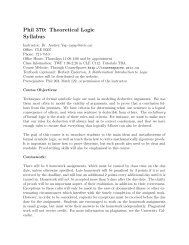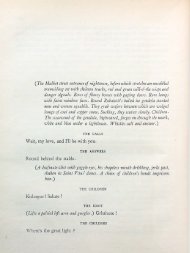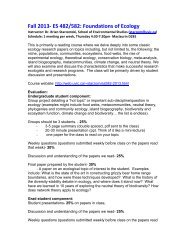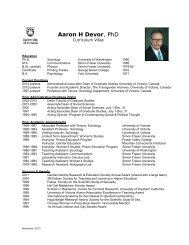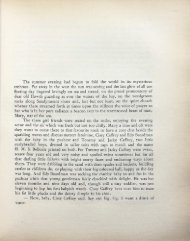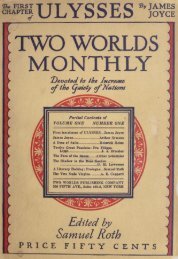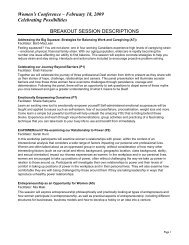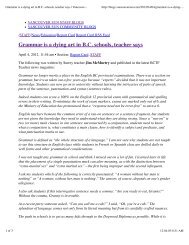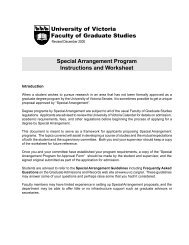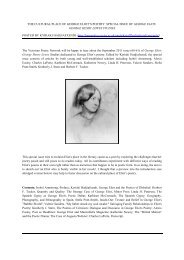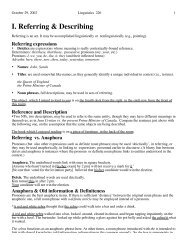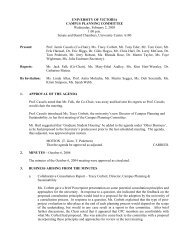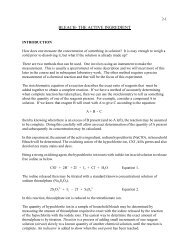"Architecture or Revolution": Taylorism, Technocracy, and Social ...
"Architecture or Revolution": Taylorism, Technocracy, and Social ...
"Architecture or Revolution": Taylorism, Technocracy, and Social ...
Create successful ePaper yourself
Turn your PDF publications into a flip-book with our unique Google optimized e-Paper software.
on the right, there was the promise of a<br />
m<strong>or</strong>e rigidly hierarchical <strong>and</strong> stable social<br />
<strong>or</strong>der; f<strong>or</strong> those on the left, the potential<br />
triumph, in Max Weber's terms, of the<br />
rationalizing bureaucrat who upheld the<br />
public good over capitalistic individualism.<br />
Le C<strong>or</strong>busier shared this ideal of a "man<br />
of good will" but also the conservatives'<br />
strong yearning f<strong>or</strong> <strong>or</strong>der.<br />
Accompanying these auth<strong>or</strong>itarian tendencies<br />
were somewhat ambivalent attitudes<br />
in L'Esprit Nouveau towards the family<br />
<strong>and</strong> its imp<strong>or</strong>tance to social equilibrium.<br />
Le C<strong>or</strong>busier's proclamations of the house<br />
as a "machine-f<strong>or</strong>-living," his rejection<br />
of the hearth <strong>and</strong> dining table as f<strong>or</strong>mal<br />
foci, <strong>and</strong> his choice in Ville Contemp<strong>or</strong>aine<br />
to design the central business city rather<br />
than the family-<strong>or</strong>iented garden city suggest<br />
a disdain f<strong>or</strong>, <strong>or</strong> at least indifference<br />
to, the French devotion to family life. In<br />
his article "Mass-Production Houses" Le<br />
C<strong>or</strong>busier made it clear that serial production<br />
<strong>and</strong> Tayl<strong>or</strong>ism inevitably dem<strong>and</strong>ed<br />
the destruction of certain values based on<br />
tradition in the interests of efficiency:<br />
The house will no longer be an<br />
archaic entity, heavily rooted in the<br />
soil by deep foundations, built "firm<br />
<strong>and</strong> strong," the object of the devo-<br />
tion on which the cult of the family<br />
<strong>and</strong> the race has so long been con-<br />
centrated.75<br />
This challenge to traditional notions of<br />
"maison," "famille," <strong>and</strong> "patrie" was<br />
exaggerated in the minds of Le C<strong>or</strong>busier's<br />
critics by L'Esprit Nouveau's interest in<br />
psychoanalysis <strong>and</strong> sexuality. Libertine<br />
literature was often reviewed fav<strong>or</strong>ably;<br />
Andre Gide's L'Imm<strong>or</strong>aliste called "a very<br />
beautiful book filled with the most diverse<br />
virtualities. "76<br />
But Le C<strong>or</strong>busier did not reject the family<br />
outright; he only discarded some of its<br />
f<strong>or</strong>ms <strong>and</strong> customs. In fact, like most of<br />
the garden city planners, he upheld the<br />
Proudhonnian ideal of the family as the<br />
primary structural unit <strong>and</strong> as a model f<strong>or</strong><br />
other social relationships.77 Part of Le<br />
C<strong>or</strong>busier's argument f<strong>or</strong> st<strong>and</strong>ardized<br />
architecture, paradoxically, was based on<br />
the preservation of this dimension of the<br />
Fig. 9 A page from L'Almanach d'architecture moderne (1925), the catalogue of the<br />
status quo:<br />
Esprit Nouveau pavilion.<br />
his town, his street, his house <strong>or</strong> his<br />
combined<br />
flat. . . hinder him [man] from fol-<br />
progressive <strong>and</strong> traditional view- po<strong>or</strong>est sect<strong>or</strong>s of society per se.<br />
lowing in his leisure the <strong>or</strong>ganic<br />
points. He was at once willing to uproot As in many of the Americanist visions<br />
development of his existence, which<br />
the "firm <strong>and</strong> strong" French family tradi- of social ref<strong>or</strong>m, there is in Le C<strong>or</strong>busier's<br />
is to create a family <strong>and</strong> to live, like<br />
tions while upholding the benevolent pater- view a blurring of distinctions between<br />
every animal on this earth <strong>and</strong> like<br />
nalism long characteristic of the French right <strong>and</strong> left. He denied the existence of<br />
all men of all ages, an<br />
housing-ref<strong>or</strong>m movement. The techno- class struggle <strong>and</strong> simultaneously de<strong>or</strong>ganized<br />
family life. In this way, society is logically innovative Ville Contemp<strong>or</strong>aine m<strong>and</strong>ed maj<strong>or</strong> transf<strong>or</strong>mations in internahelping<br />
f<strong>or</strong>ward the destruction of<br />
channeled social interaction to fit patterns tional policy <strong>and</strong> property ownership. It<br />
the family, while she sees with terr<strong>or</strong><br />
of social hierarchy <strong>and</strong> family structure. was a position that purp<strong>or</strong>ted to transcend<br />
that this will be her ruin.78<br />
Any changes in social <strong>or</strong>der resulted pri- political categ<strong>or</strong>ies; yet, in contrast to the<br />
marily in benefits f<strong>or</strong> the progressive cadre apolitical cast of Beaux-Arts academicism<br />
As with Le C<strong>or</strong>busier's polemical juxta- of modern industrual society. Lacking in (involving the passive end<strong>or</strong>sement of the<br />
position of the Parthenon <strong>and</strong> the automo- his technocratic w<strong>or</strong>ld view was any con- status quo), it was deeply engaged in social<br />
bile, his discussion of social structure cept of improving the condition of the <strong>and</strong> political issues. F<strong>or</strong> Le C<strong>or</strong>busier, as<br />
140 Art Journal



